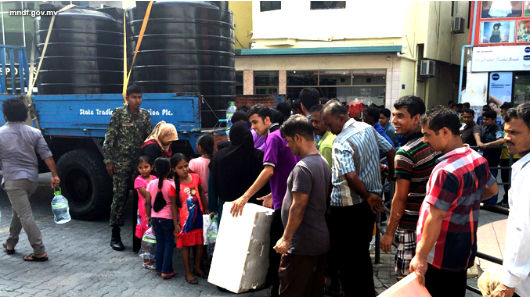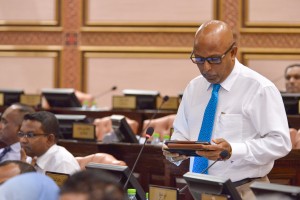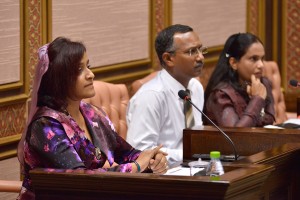Minister of Defence Mohamed Nazim has said foreign aid will be sought as repairs to Malé’s water desalination plant are expected to cost US$20 million.
Speaking at a press briefing of the president’s task force this morning, Nazim called for donations, revealing that US$1.5 million had already been received.
Islamic Minister Dr Mohamed Shaheem Ali Saeed has revealed that an unnamed Saudi donor had already gifted US$1 million, while discussions with the Saudi, Qatari, and Kuwaiti governments were ongoing.
Government offices and schools remain closed in the capital today as the water crisis – caused by a fire at the Malé Water and Sewerage Company (MWSC) last week – enters its third day.
As foreign aid continues, government officials have assured there is sufficient water supplies, although difficulties remain in transmitting the limited supplies being produced by the MWSC to all 130,000 inhabitants.
“Because Malé is so congested, larger quantities and higher pressure is needed to reach higher floors,” Minister at the President’s Office Mohamed Hussain Shareef told Minivan News, assuring that the situation would continue to improve despite being a “logistical nightmare”.
Up to two of the MWSC’s nine reverse osmosis plants have been restored, he explained, although the need for custom built replacements were causing delays.
“Every time we fix a panel, more water is getting pumped into the bore hole. We have been withholding some in order to build pressure.”
“Unfortunately, the capital is so big that until we repair the panels, there is no way we can provide 24hr running water,” said Shareef.
Defence Minister Nazim told the media that water will turned on between 10pm and 12am this evening, with new panels expected to arrive from Singapore on Wednesday.
Emphasising the scale of the problem, Shareef said that the plant normally produces 20,000 metric tonnes per day, of which 80 percent is consumed.
MWSC had one day’s worth of supplies at the time of the fire, he explained, directing further enquiries regarding contingency plans to the company, which was not responding to calls at the time of publication.
Asked about the cause of the fire, Shareef said that eyewitness accounts had suggested an electrical problem, although forensic teams were still investigating.
Aid efforts continue
Shareef applauded the efforts of citizens of Malé, rubbishing reports of violence and unrest carried in the international media.
“When something happens here, people work together – there is a spirit of camaraderie,” he continued. “ Even the boy scouts are helping”.
As health authorities release information for the safe use of water, Shareef assured that all donated water was being checked: “At the moment, there are no health risks at all”.
The Maldives National Defence Force – which continues to distribute water between 2pm and 6pm today – has explained that water is available from 27 ‘mobile points’ as well as the capital’s ten designated distribution centres.
“The mobile points are mainly aimed at bakeries, restaurants, and places serving food, but can be accessed by the general public also,” explained Spokesman Major Hussain Ali.
The Ministry of Health yesterday urged Maldivians to eat food prepared at home during the crisis, while many restaurants in the capital have begun to offer reduced menus on disposable plates.
Information distributed by the Health Protection Agency (HPA) told people to only drink water that has been boiled or filtered – particularly rainwater – warning that well-water was not recommended for drinking or cooking.
Bottled water should be used only for drinking, with alternative sources used for hygiene and other purposes the HPA continued.
Meanwhile, the Indian High Commission has revealed that INS Deepak – carrying 800 tonnes of fresh water, with the capacity to produce 200 tonnes of fresh water per day – is expected in Malé later today.
As of yesterday evening, Indian aircraft have provided just under 300 tonnes of water while INS Sukanya arrived on Friday (December 5). The tenth Indian plane arrived with a further 38 tonnes this afternoon.
38 Tanuge Fenaai Eku India Askariyyage 10 Vana Mathindhaa Boatu Ibrahim Nasir International Airportah Jassaifi pic.twitter.com/4w8tF9ISaS
— MNDF (@MNDF_Official) December 7, 2014
Speaking with local media this weekend, Indian High Commisioner Rajeev Shahare said: “We’re always there for the Maldives and we shall always be”.
The Friendship Association of India-Maldives released a statement yesterday thanking Prime Minister Narendra Modi and the people of India for their “timely assistance”.
“The swift and prompt assistance further reiterates the time-tested, all-weather friendship between the people of our two brother Nations,” read the press release.
Sri Lanka and China have also provided fresh water supplies since the crisis began, with the latter also reported to have donated US$500,000 to MWSC.
Additionally, the Bangladeshi High Commission in Malé has told Minivan News that a naval vessel carrying 100 tonnes of fresh water from Chittagong is expected to reach Malé on Thursday (December 11). The ship also has reverse osmosis facilities.
Related to this story
President Yameen to return to Maldives as water crisis enters third day
Indian aircraft arrives to ease Malé water crisis
Malé water supply cut after fire at MWSC
Nasheed calls for inquiry into MWSC fire



